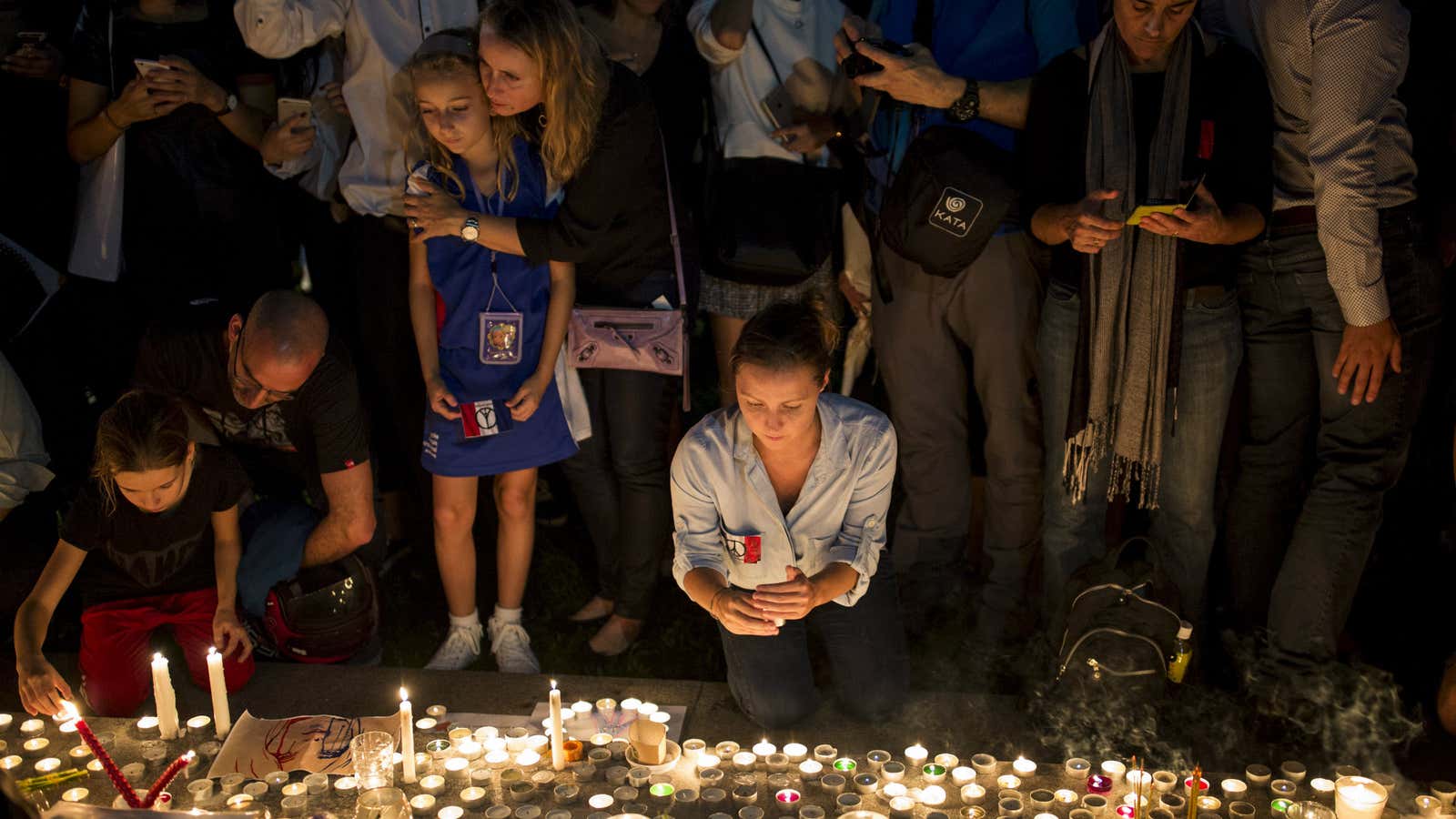Paris
There is a new and chilling element to the terror threat in France, French terrorism experts say: suicide bombers. The Nov. 13 attacks in various locations in Paris’ 10th and 11th districts killed 130 people and injured more than 300. A planned suicide attack on the La Défense business district was reportedly thwarted by security services. ISIL claimed responsibility for the attacks.
Louis Bernard, founder of crisis management firm Layer Cake in Paris, said the use of suicide bombings brings with it a clear message. “This shows they are ready for anything to hurt France,” he told Quartz. “They are ready to follow through with the idea of martyrdom. Suicide bombings have never happened on French soil. We’re used to seeing that elsewhere like in Iraq.”
Terrorism, however, isn’t new to France. The first recorded incident, an unsuccessful attempt to assassinate Napoleon Bonaparte in Paris, occurred in 1800. Terrorism in the 20th century often involved assassinations of government or corporate officials. But recently, with the deadliest attacks attributed mostly to Islamist terror groups, the targets of terror are changing.
On Jan. 7, the Kouachi brothers shot dead cartoonists for the satirical newspaper Charlie Hebdo. In a related attack, a terrorist took hostages at a kosher grocery store. In the most recent attack, though, the perpetrators were not seeking out particular individuals or religions.
“It’s the Parisian spirit that is targeted, the idea of what France is all about,” Bernard said.
Jean-Louis Bruguière, a former anti-terror magistrate, said that these most recent attacks presented additional challenges that stricter internal security measures cannot preclude.
“The threat was extremely high, with a multitude of possibilities for an attack,” Bruguière told Quartz. “It was planned from Syria and organized in Belgium. The individuals weren’t on our radar. We can’t act in Belgium, and Belgium didn’t detect this network. There is the issue of European cooperation. It exists, but there are weaknesses.”
France is one of the 26 countries in the Schengen Area, where citizens of member countries can circulate from country to country without showing a passport. Meant to help citizens travel and work freely throughout the region, the agreement has resulted in easier passage of terrorists and arms across borders. EU members are debating how to strengthen border checks without scrapping a crucial element of European integration.
“France is going to take measures, but Europe must do the same,” Bruguière said.
Layer Cake’s Bernard said that increased security is helpful, but it isn’t the only factor that must be considered when facing the existential threats that stem from the type of terrorism France now faces. At least five of the terrorists involved in the recent attacks were French.
“Where did France fail, what did France do to create enemies of this country?” Bernard said:
We have to ask ourselves questions about the model of integration and education. It would be simpler to accept if the attacks were coming from people outside of the country. Before they were jihadists, they were French kids. The response has to be from the educational and social perspective. And that’s a lot more difficult than security.
The Algerian War from the mid-1950s to early 1960s led to Algeria winning its independence from France as well as an influx of French-Algerian immigrants onto French soil. The movement marked the beginning of France’s struggle to accommodate this new and growing Muslim population.
Today, many Muslims still live in shoddy public housing on fringe areas of cities and feel disenfranchised. They face higher unemployment rates and uncertainty about their futures. About 19% of immigrants in France, all nationalities included, were unemployed in 2014 compared with 9% of French citizens, according to statistics agency INSEE.
Safety “measures are being put in place,” Bernard said. “The other part is long term. How do you make people born here care about France? It’s not adding more police officers that will help with that.”




